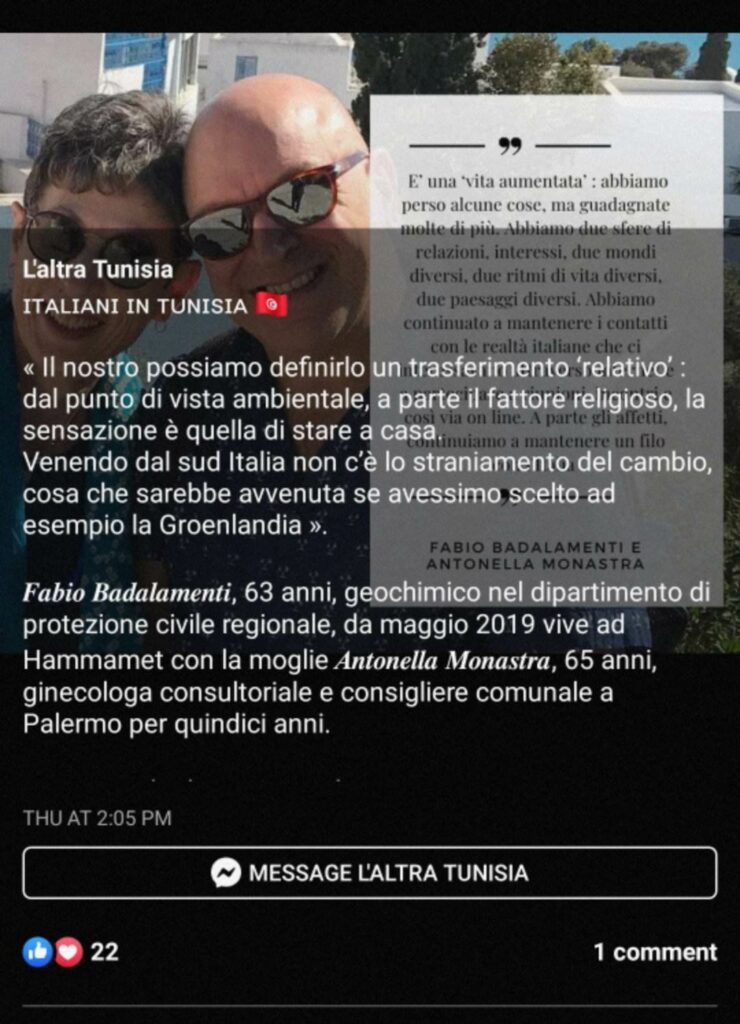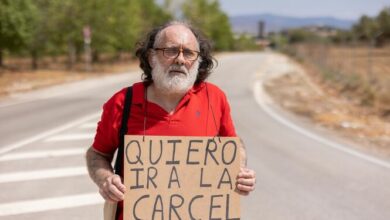The Italian community in Tunisia: the other facet of a familiar tale
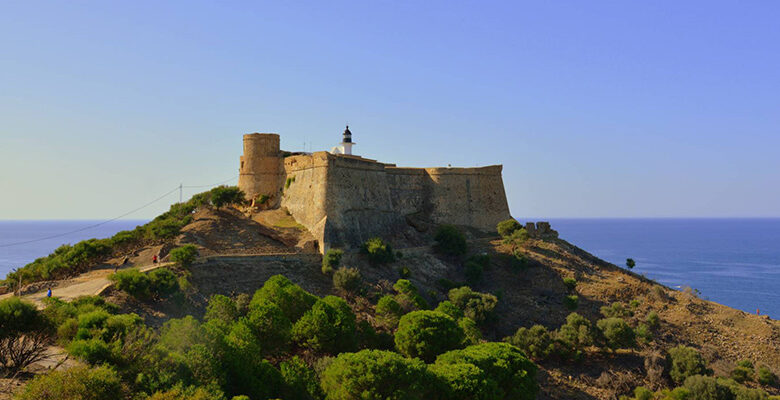
In the mainstream Western media, immigration in the Mediterranean Basin has been constructed as unidirectional from south to north. This one-way narrative has interwoven into other images of rag-tag fishing boats braving the Mediterranean Sea and carrying on board the hopes of dark-skinned immigrants who dream of taking some share of Europe’s riches- all of which are ingredients that make the perfect recipe for boosting the Western ego, whether leftist or nationalist.
But immigration in the Mediterranean is not one-way. The opposite direction of this narrative is for real but people are distracted from it by the human, economic, and political cost of mediatised mainstream one.
Since the end of the 19th century, Tunisia has been home to the aspirations and undertakings of many Italians who were driven out of their homeland towards North Africa and the American continent by economic hardships and political instability faced by the new-born nation.
But the earliest records of less significant Italian immigration to Tunisia date back to the 16th century when coral reef hunters from Genoa settled in the coastal city of Tabarka where they left a fort that stands witness to this encounter between the two worlds until today. In the same century, Jews from Tuscany made it into the North African country.

In the 19th century, a decade before French colonialism, and within the context of Franco-Italian rivalry in Tunisia, an agreement was signed in 1868 between the Beys of Tunisia and the Italian government to give the latter administrative, consular, cultural, and economic privileges that enhanced mass migration of Italian workers to Tunisia. These privileges were maintained, though some of them reduced, later in an agreement in 1896, after Tunisia came under French rule.
In the first half of the 20th century, the community grew significantly reaching 10000 until Italy was defeated in WWII. After this date, the French colonial authorities placed resterictions on Italian culture and economic activities in Tunisia. Further restrictions were introduced after independence as the European identity of the Italians brought them closer to the image of colonizers in the minds of the Tunisians.
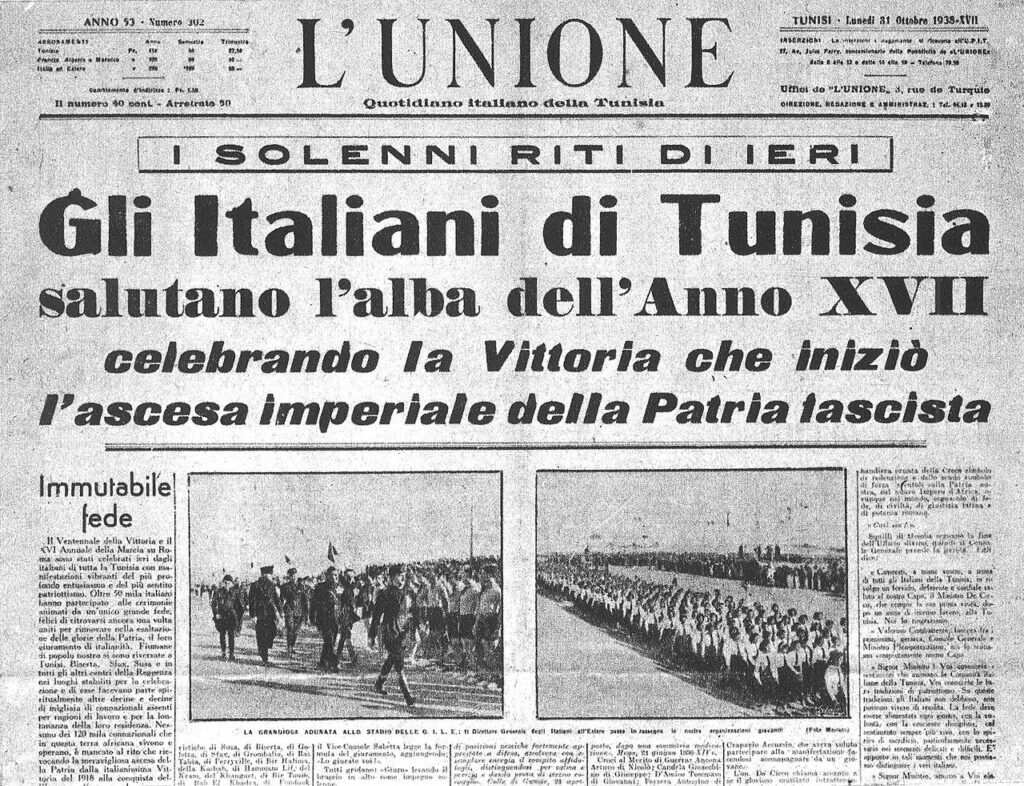
Today, Tunisia continues to attract many Italians but for different reasons. The community is made mostly of retirees who want to profit from the cheaper cost of living in Tunisia, the low rate of the Tunisian Dinar, and Tunisia’s lower taxes. Other pull factors for these retirees include the agreement between Tunisia and Italy that Italian expatriates can have access to Tunisian public healthcare, which though way behind the European standards in terms of infrastructure, employs professionals who match their European counterparts in terms of skills.
This is not the only reason for Italians to immigrate to Tunisia. A smaller part of this community is made of younger Italians married to Tunisian spouses with whom they chose to raise their kids in the North African country. Others study and work in Tunisia.
As of 2019, 10000 Italians lived in Tunisia. Other estimates give figures that amount to 60000. Most of the members of this community live in Tunisia’s coastal cities mainly in the Cap Bon peninsula, few tens of kilometres away from Sicily.
Today, the Facebook page Associazione Italiani di Tunisiacounts more than 1 400 members. The Facebook page Italiani in Tunisia, which literally means “Italians in Tunisia” counts 24 000 members of Italian expatriates in Tunisia, Tunisians interested in interacting with this community, and Italians curious about life in Tunisia or interested in moving to the North African country.
On this very responsive group, many Italians discuss issues in Tunisia, share experiences, satisfy their curiosity, and seek help and recommendations on legal and fiscal differences between Tunisia and Italy. Scrolling through the latest posts in this group is enough to see into many of the impressions and attitudes that can result from this continuous encounter between two close yet very distant cultures. It also gives an insight into different aspects of this life and the interactions with the locals it engenders.
The group is also replete with job offers for Tunisians and Italians alike, offers of services, and pictures recording adventures and experiences in attractive spots around the country. Tourists planning to come to Tunisia also ask for recommendations depending on their preferences. Posts on Tunisian and Italian politics are also present. Posts by Tunisian-Italians celebrating their bicultural heritage and the benefits it offers appear sometimes on this group.
Mario Bonalberto, for example, complains of the conduct of a taxi driver who drove him with others for 10 kilometres without exchanging any word with them because he drove with one hand and was busy using the other hand to talk on the phone.
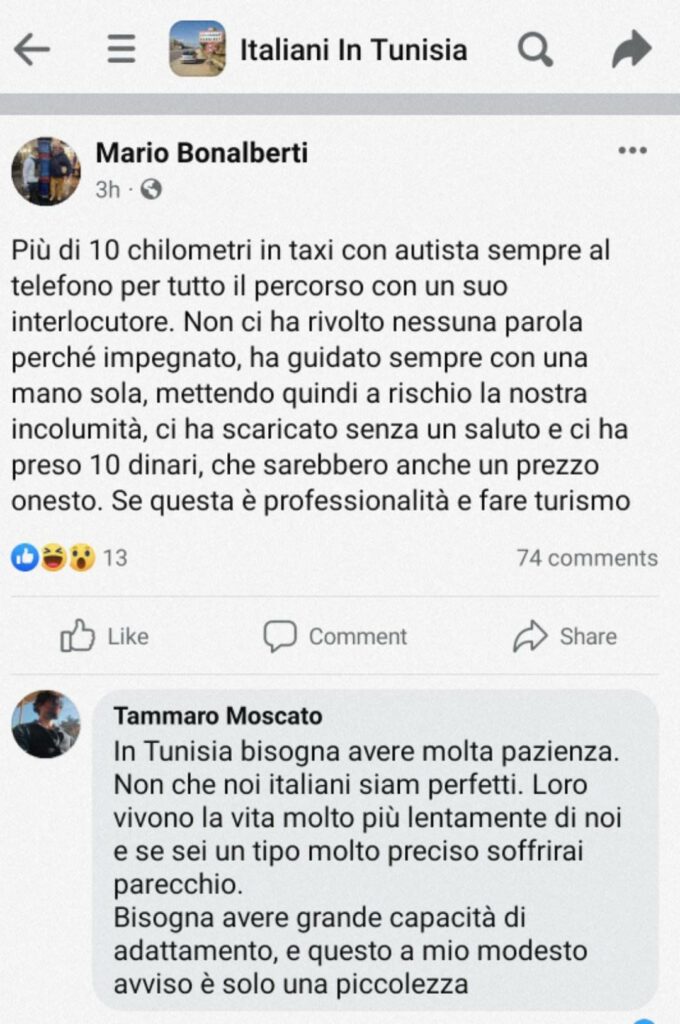
Tamaro Moscato comments on this post recommending patience when it comes to life in Tunisia. “It is not because, we, Italians are perfect,” he explains. “It is rather because Tunisians are taking life easy more than we do.”
Another Italian Facebook user says she has divorced the Tunisian father of her daughter and that she is planning to come with this daughter soon to Tunisia. Most of the other users recommended she avoids doing that due to legal implications.
Angela Ruzzu asks the members of the group if she can bring her car with her into Tunisia. Ricardo Baldussu answers her question, explaining that it is easy to do that. He warns her that there is a 3-month time-limit for her to use her car.
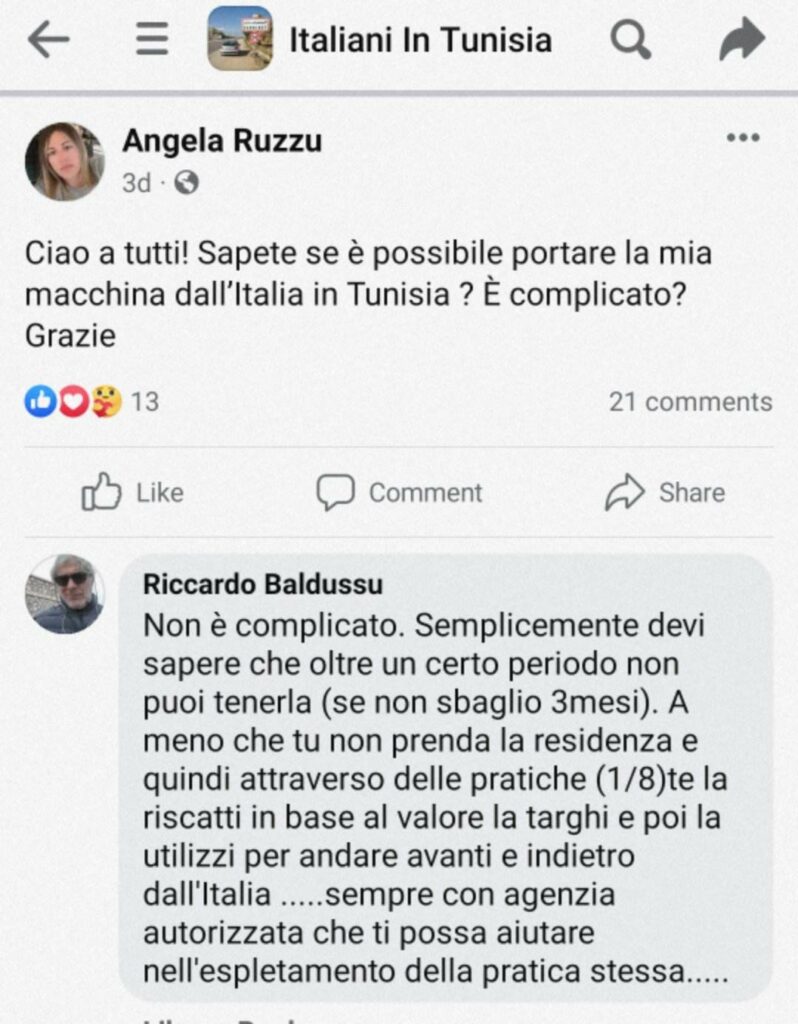
Giovanni Carfagna asks his fellow Italians if charging electric cars is possible. Antonio tells him that at the moment charging electric cars is a problem but he expects the problem to be resolved soon.
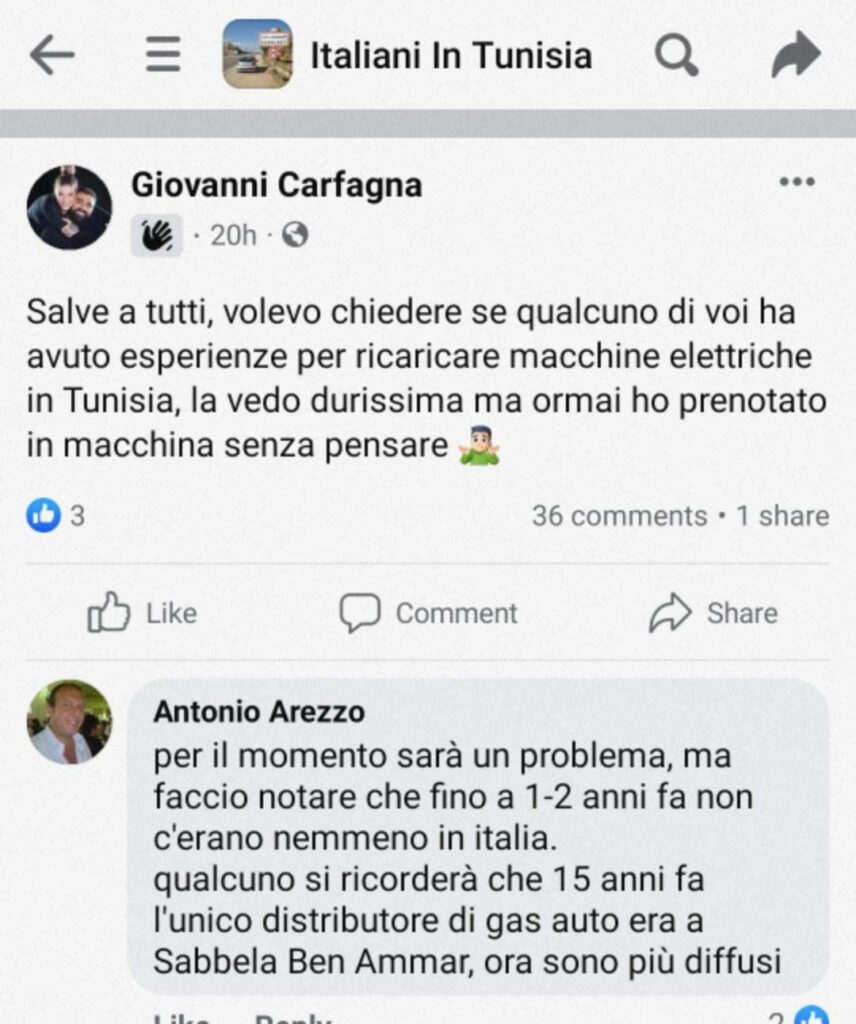
Mary Ben asks the retired Italians if besides the positive comments on their life in Tunisia that dominate the interactions with the posts on the group, there are negative aspects of their life in Tunisia. Giuseppe tells her that the most negative aspect is healthcare. He explains that residents in Tunisia lose the right to healthcare in Italy. Due to his health problems, he goes on, he regrets the decision to move to Tunisia and calls on other Italians to think twice before settling in the Maghreb country.
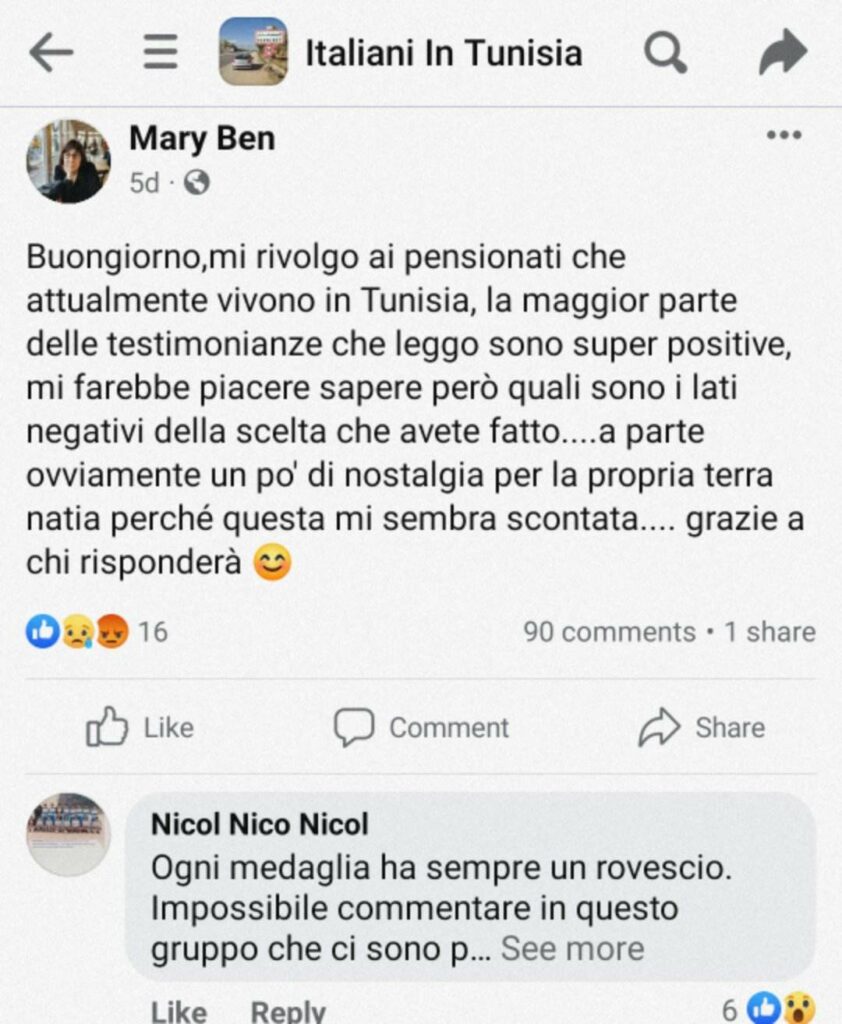
Alberto replies to this comment by telling Giuseppe that he might be unaware of alternatives that exist in Tunisia and recommends some names that can help him. Pierangelo calls the attention of Giuseppe to the cheaper cost of specialized healthcare in Tunisia. Grazia urges, on the other hand, Mary to discover Tunisia on her own instead of relying on other people’s impressions.
The community is growing fast enough to call the attention of academics and journalists. Conferences on the history of the community are held in Tunisia and Italy. The Arab Weekly published, in 2019, article entitled “Italians return to Tunisia, to retire by the sea,” where Michael Cousins discusses the economic factors behind Italian migration to Tunisia.
L’Altra Tunisia, “The Other Tunisia” in English, is an Italian-language website that offers stories from Tunisia to an Italian speaking audience. On their Facebook page, the managers of this website post testimonies by thriving Italian expatriates in Tunisia on their life in North Africa and how it contributed to their success. It also posts summaries of their artistic and scientific achievements.
One of these is Mario Sei whose recent book Message in a Bottle tells the stories of several Tunisian irregular immigrants in the first person. In another post, Fabio and Antonella, an Italian couple living in Hammamet, say that moving to Tunisia entails certain inconveniences but it has equally conferred on them the privilege of belonging to two different worlds at the same time.
